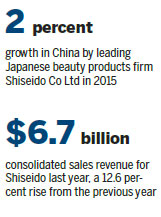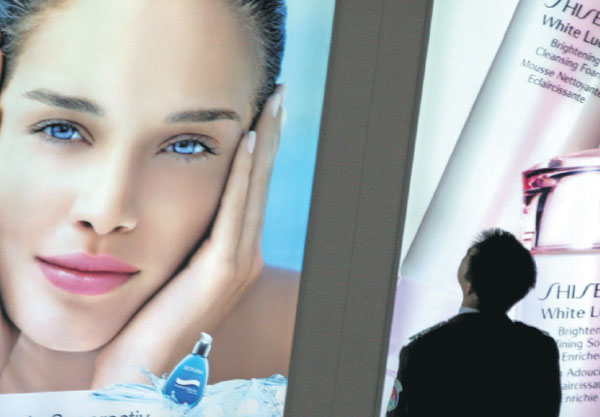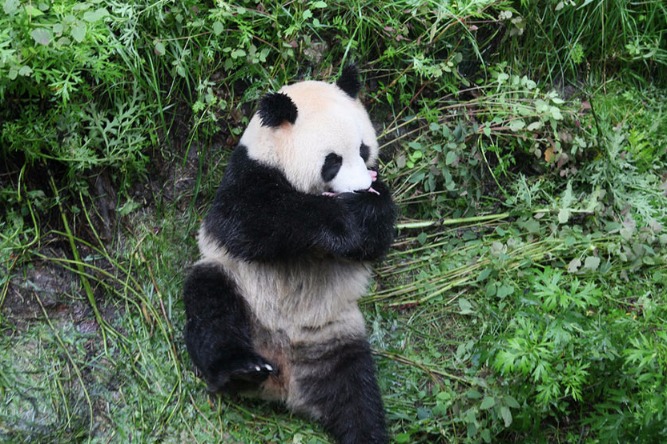Chinese buyers buoy Shiseido sales
One of Japan's leading personal care companies has reported strong demand for its products from Chinese visitors to the country, despite weaker growth in the Chinese market itself.
The latest figures from Shiseido Co Ltd revealed its 2015 annual sales rose 12.6 percent to 763.1 billion yen ($6.7 billion). Analysts said that the increase was helped significantly by Chinese tourist sales.
The group's operating income rose 77.4 percent to 37.7 billion yen, but its China business grew by just 2 percent.
"We have seen a substantial increase, both in sales and income, mainly due to our major brands in the domestic market," said Norio Tadakawa, its corporate officer and CFO, who added both its operations in Beijing and Shanghai struggled last year.
Sales at its Shanghai outlet have been flat for several years, he said, adding the firm is now planning to reverse that with a targeted 10 percent growth this year in China.
In the medium to longer term, he said, "we are seeing more of the middle-class market, so we will keep on expanding consumption and diversification" of products, adding its e-commerce business is expected to grow 20 percent in China.
Tadakawa said Shiseido is also planning a new innovation center in China, which will help the firm grow market share.
He admitted, however, that competition from South Korean brands is intensifying, making its job in China harder.
According to Kantar Worldpanel China, sales of South Korean cosmetic brands are now growing faster than Japanese brands, at 33 percent compared with 11.6 percent, focused mainly on high-end products.

Shiseido's results followed closely on the heels of those from Japanese beauty care rival Kao Corp, which announced net sales increased 5 percent compared with the previous year to 1.47 trillion yen for the year ended Dec 31.
Its profits increased, said officials, due to the effect of increased sales of healthcare products in markets across Asia.
Net income increased 19.3 billion yen compared with the previous fiscal year to 98.9 billion yen, with beauty sales increasing 3 percent, while cosmetics sales decreased 2.3 percent.
Laurie Du, an analyst at Mintel Group Ltd, the United Kingdom-based research firm, said Chinese consumers have gained more awareness of international brands through frequent overseas travel, especially for Japanese goods bought in Japan.
Du said products made in Japan now represented 29 percent of all skincare product sales by Chinese travelers, which is higher than goods from both South Korea and France.
"Chinese consumers strongly believe in the competitiveness, quality and price of Japanese products," she said.
Jason Yu, general manager of Kantar Worldpanel China, said it had also seen a significant rise in demand for everyday Japanese fast-moving-consumer products by Chinese buyers in Japan.
But he added that it remains critical for Japanese marketers to expand their product offerings to avoid missing out on what are likely to be growing numbers of Chinese traveling overseas for goods.
wangzhuoqiong@chinadaily.com.cn
| A man checks out a Shiseido Co Ltd's beauty products advertisement in Beijing. The Japanese company's China business grew by only 2 percent last year.Provided To China Daily |
(China Daily USA 02/17/2016 page13)



















